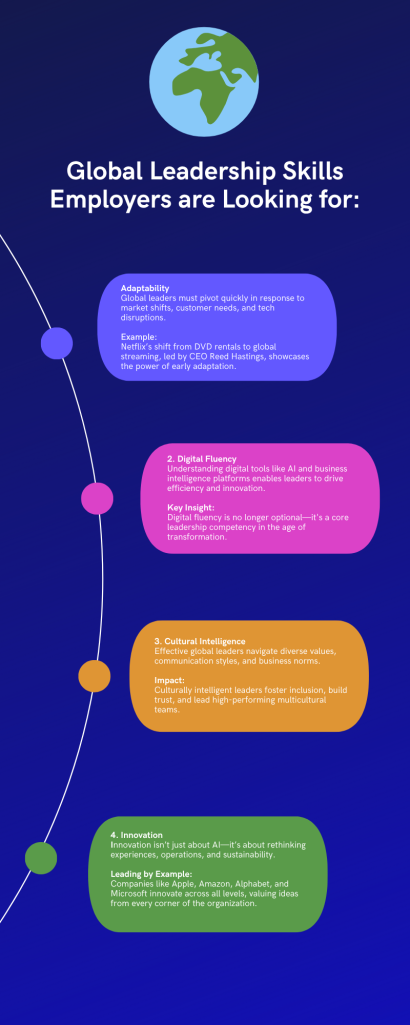Today’s innovators aren’t waiting to “go global”; they are starting global.
The old model of “two guys in a Silicon Valley” is giving way to cross-border collaborations—like a group of coders in India, a team of UI/UX designers in Singapore, and marketers in London building a global business.
Entrepreneurs are now just as comfortable and confident sourcing top talent and funding around the world as they are within their own country.
The Future of Business Is Global
International expansion is becoming more important than ever in a company’s business strategy. Here’s why:
1. New Revenue Streams
Entering new markets diversifies income and reduces reliance on a company’s home market. A McKinsey study of 5,000 global companies found that those expanding internationally delivered 1.9 percentage points higher annual shareholder returns than their peers.
2. Access to Global Talent
Establishing a presence near skilled labour pools can simplify hiring, particularly beneficial for tech-driven businesses.
3. Tech Simplifies Global Expansion
With cloud platforms, e-commerce, and remote collaboration tools, businesses can expand into new regions at low cost. Even small companies can now serve international clients efficiently without setting up physical offices.
4. Diversifying Against Global Risks
Global expansion helps companies spread risk. Economic, political, or regulatory issues in one country can be balanced by stability in another, particularly in a post-pandemic, inflation-sensitive global economy.
5. Access to Innovation Hubs
Tapping into global innovation clusters (like Singapore for fintech, Germany for engineering, or India for IT) gives companies access to cutting-edge ideas, R&D, and partnerships that aren’t available in their home ground.
6. Sustainability & ESG Opportunities
Many countries offer incentives for green businesses or those that meet ESG (Environmental, Social, Governance) criteria. Expanding into these regions allows companies to align with global sustainability goals and attract ESG-focused investors.
7. Innovation From Local Demand
Adapting to different consumer preferences can lead to product innovations that benefit the brand even in home markets.
For example, Apple is investing heavily in India, driven by its fast-growing consumer base. The company has opened flagship stores and ramped up local production, highlighting how local demand can shape global business strategy.
8. Pro-business Tax Rules
Some regions offer corporate-friendly tax policies or simplified business regulations, which can improve margins and encourage long-term investment.
9. AI-Driven Market Entry Businesses can use Generative AI and Large Language Models (LLMs) to plan better for the future. These tools help leaders spot blind spots, test different scenarios, and make smarter decisions, faster and cheaper than traditional methods.
Key Global Trends Shaping Business Leadership
The following trends are also influencing the global expansion of a business and rethinking the future of leadership.
1. Ongoing Global Tensions and Uncertainty
The global order is under severe strain—arguably its biggest test since the Cold War or even World War II. Rising tensions and conflicts are making global business more unpredictable, demanding leaders who can navigate uncertainty with speed and clarity.
2. Balancing Global AI Rules
The global AI race is intensifying, but regulations vary. While the European Union (EU) prioritises safety through its AI Act, the US focuses on national security, and Singapore balances innovation with ethics through its National AI Strategy 2.0. Navigating these differences will be a key business leadership quality.
3. Green Policies Drive Sustainability in Business
Governments are stepping up efforts to grow low-carbon industries and secure critical resources. The EU’s Green Deal Industrial Plan commits €357 billion to support clean growth. Singapore’s Green Economy framework promotes innovation and sustainability in business.
These policy shifts, often tied to local investment rules, are reshaping global supply chains and influencing corporate strategy.
4. Asia’s Growth Outpaces Global Trade
Asia remains a key engine of global economic growth. According to the Boston Consulting Group Global Trade model, trade in India and the Association of Southeast Asian Nations (ASEAN) is projected to grow at 6.3% and 4.1% annually over the next decade, well above the global average 2.8%.
5. BRICS+ Expands Its Global Role
Originally made up of Brazil, Russia, India, China and South Africa, BRICS expanded in 2023 to form BRICS+ with the addition of Saudi Arabia, the United Arab Emirates, Egypt, Iran and Ethiopia.
The group now controls 43% of global oil production and plans to launch new institutions like a development bank. This indicates that BRICS+ could grow into a stronger voice in international affairs as a counterbalance to Western-led systems.
In light of these global shifts, specific leadership skills are more critical than ever.
How Business Education Supports the Future of Leadership
The next generation leaders will be characterised by their ability to adapt effectively to global events and trends shaping our world. Hence, future leaders will require the right business leadership programme to cultivate skills oriented toward the future.
MBA Global, offered by the London School of Business and Finance in Singapore, awarded by the University of Greenwich, is designed with this in mind.
The programme provides recent graduates and early-career professionals with the opportunity to develop a global mindset in today’s changing business landscape, featuring a comprehensive curriculum that includes leadership, data analytics, sustainability practices, and more.
Speak to our Education consultants to learn more about LSBF Singapore’s MBA Global programme today.




